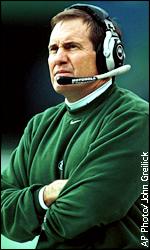| | The phone rings at 8:30 a.m. It's Bill Belichick, and he's already been up for hours -- with two things on his mind.
|  | | Belichick's style isn't all that different from Knight's -- it's just a little more subtle. |
The first is his team, the New England Patriots. "Today's our first day out of the blocks," the New England Patriots head coach says brightly from his Foxboro, Mass., office. "We're going to see what we've got."
The second is Bob Knight, the Indiana University basketball coach and Belichick's friend.
Belichick knows all too well that a coach is the ultimate authority figure, the surrogate parent. As parents are intimately aware, their job isn't easy, even in the privacy of their homes. Try doing it in a public forum, where all the tweaks, confrontations and fallout spill into the public domain.
Knight understands this. The day after Knight was disciplined -- IU president Myles Brand played the role of the stern father -- Belichick talked about his friend.
Belichick, at 48, comes from a different generation than Knight, who will turn 60 before the 2000-2001 season begins. Still, they have similar personalities and coaching philosophies; it's just that Belichick delivers his cryptic messages with more subtlety. When Belichick was the Giants' defensive coordinator in the go-go '80s, his players called him "Doom." Affectionately, it should be noted.
Belichick came to know Knight through his friendship with Bill Parcells. The same year Knight was elevated to head coach at Army (1966,) Parcells joined the football staff as linebackers coach. They were separated only by a year in age and grew quite close in four years together. They still are. Belichick has watched Knight's team practice and has addressed the Hoosiers at halftime and after games.
The perception is that Knight hasn't changed his by-any-means-necessary approach in 30 years. The perception, according to Belichick, is wrong.
"I don't agree with that," Belichick says. "I think he's changed. Yeah, in his own way, relative to Bobby Knight. I'm telling you, he's not the same guy he was in 1970.
"Everything he does, regardless of his method, everything has been in the best interest of the kid and the team. When you and I were spanked as children, we didn't realize it at the time, but the intent was to help the kid. That's what his intent is."
The statement that Knight released last Saturday acknowledged his rough bedside manner in a conciliatory tone that suprised many in Indiana.
"My temper problem ... it's something I've had to deal with for as long as I can remember," Knight said. "There are times when my passion for basketball led me into confrontations that I could have handled a lot better. I've always been confrontational, especially when I know I'm right.
"I know as well as anybody does: I have to develop a more diplomatic approach. I'm not very good at just forgetting something and going on, and I'm truly sorry about that. I am working on it."
| |
“ |
Everything he does, regardless of his method, everything has been in the best interest of the kid and the team. When you and I were spanked as children, we didn't realize it at the time, but the intent was to help the kid. That's what his intent is.
” |
|
|
—
Bill Belichick, on Bob Knight
|
Belichick says that Knight's approach, like a parent's, shouldn't be judged immediately.
"Obviously, he has a style," Belichick says. "But a lot of his players, they look back and see the things he did for them and they have more appreciation for it than when he was yelling at them. I have seen him yell at players and never seen him react afterward by saying, 'Gee, I really laid into them that time.'
"It's true what they say about parents. It hurts them more than it hurts you. You're crying in the corner and you don't understand that. I think that's where his temper comes in. It's frustrating to him that he has to discipline them. On one level, you've failed to communicate because you're forced to take that corrective action."
Even if Knight has modified his behavior in recent years, it's clear that society has evolved on a faster track. Kids, athletes, are vastly different animals than they were 30 and even 20 years ago. Goodbye spanking; hello video games. A gross simplification, but it frames the way the approach to children has changed. Think about it.
Coaches certainly do. Belichick was 23 years old when he landed his first NFL coaching job, as an assistant to Baltimore Colts head coach Ted Marchibroda. Twenty-five years later, his audience has changed.
"There was a statistic that they threw out at the [scouting] combine that got my attention," Belichick said. "We had more than 300 kids there and 85 percent came from one-parent families. That's the reality today, those are the players you're coaching. I don't know what the number was 20 years ago, but I know it wasn't anything like that. Talking to that group, you can't casually say, 'Well, when your parents made you do this or that.' The frame of reference is so different.
"I've tried to adjust to that. All coaches do. I don't think you compromise your principles. You just have to recognize that you're dealing with kids who are coming from a different place than you were when you were growing up."
With that, Belichick was off. On Tuesday, the Patriots began to work on their passing game in earnest. For Belichick, who guided the Cleveland Browns from 1991-95, it is a second chance to put his stamp on an NFL franchise.
He knows that, like Knight, his success will depend on his ability to lead, to communicate with and to teach his players.
| |
ALSO SEE
Knight to remain as Indiana's head coach
Katz: All eyes on Knight starting now

|



